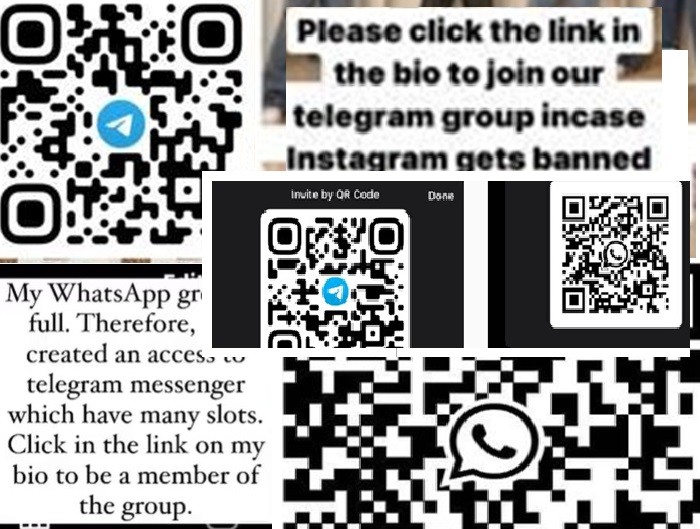A collage of screenshots taken from Instagram accounts based in Nagaland. As the May 26 deadline for tech giants to comply with new Information Technology rules approaches in India, popular ‘online stores’ on Instagram were quick to react and adapt to the unfolding situation by offering other alternatives to their customers. (Morung Photo)

Morung Exrpress News
Dimapur | May 26
As the May 26 deadline for tech giants to comply with new Information Technology (IT) rules approached in India, there were considerable buzz regarding possible ban of popular social media apps like Instagram, WhatsApp and Twitter.
Nagaland was no exception to the unfolding situation. The buzz was most visible on Instagram, which in recent years has become a thriving platform for people to sell or purchase product online – from individuals to big retail stores.
In the run-up to the deadline however, popular ‘online stores’ on Instagram such as ‘thrifts stores,’ boutiques etc were quick to react and adapt to the unfolding situation by ‘backing up’ their stores elsewhere.
Most status updates and posts were information on possible ban and offering customers to avail uninterrupted services via alternative platforms or personal contacts.
The Telegram messenger was among the most preferred destinations.
“Sad to hear the news of the Instagram ban in India but hoping that it won’t be banned for now but in case of emergency call…” read an update by a popular Dimapur-based boutique with over 40,000 followers on May 25.
“My WhatsApp group is full. Therefore I’ve created access to telegram messenger which have many slots. Click in the link on my bio to be a member of the group,” posted another account dealing with ladies apparel.
“Please scan this QR code to join our WhatsApp group… We will be posting everything over there if Instagram gets banned… Please keep supporting us,” informed another popular thrift store to its customers.
Other informed that they are keeping the new platform even if Instagram doesn’t get banned. “I will be active on telegram and I’ll update prior information related to my drops, therefore become a member of it and enjoy the service…” updated another popular store.
“Link in bio or scan QR code to join our Telegram group. Whether Instagram getting ban or not, I will be using these group to update you for any upcoming drop before I make announcement on Instagram. It will be like a little VIP section…,” added another.
Meanwhile, such measures were not restricted alone but across India.
“We are getting DMS all day regarding the Instagram issue and unsure of the whole situation really. And was just skeptical that in case, the policy issue is with FB and IG, then the WhatsApp group might not be the best solution since it is the same company! So we have made a telegram group currently so we can update everything there and stay connected in case the news is true,” read a status update by a popular store based outside Nagaland.
What is Intermediary Guidelines and Digital Media Ethics Code?
On February 25 this year, the Union Government notifies the Information Technology (Intermediary Guidelines and Digital Media Ethics Code) Rules 2021, purportedly designed at empowering the “ordinary users of digital platforms to seek redressal for their grievances and command accountability in case of infringement of their rights.” The new IT rules and guidelines will come into effect after three months i.e. May 26, the centre then informed.
A report by PTI news agency then stated that the new rules, among others, require social media firms like WhatsApp, Facebook, Twitter and other social media firms (termed as 'significant' social media intermediary) to appoint executives to coordinate with law enforcement and any contentious content flagged by the government or legal order has to be taken down quickly.
The guidelines require social media intermediaries to appoint a resident grievance officer, who shall register complaints in 24 hours, and file monthly compliance reports. User grievances have to be resolved within 15 days, it added.
Also, social media platforms on being asked by court or government will be required to disclose the first originator of the mischievous information that undermines the sovereignty of India, security of the state, or public order.
Besides, the code will also set guidelines for digital publishers of news and current affairs content as well as well as streaming services such as Netflix, YouTube and Amazon Prime Video.
The rules were aimed that curbing misuse of those social media platforms, the Government maintained, though critics argue that it, among others, invasion of privacy and free speech.
The issue of banning gained momentum as deadline approached and many social media platforms were yet to comply with the rules such as appointment a resident grievance officer, a chief compliance officer, and so on.
WhatsApp files plea on HC
Meanwhile, according to an IANS report, Facebook-owned instant messenger WhatsApp, in a petition in Delhi High Court on May 26, said that enabling identification of the first originator of information on its platform in India puts end-to-end encryption and its benefits at risk and urged the court to pass direction to declare this requirement ultra vires the IT Act.
It has challenged the requirement in the Information Technology (Intermediary Guidelines and Digital Media Ethics Code) Rules, 2021 ('Intermediary Rules') that intermediaries like it enable "the identification of the first originator of the information" in India on their end-to-end encrypted messaging services (traceability), upon government or court order, it added.






